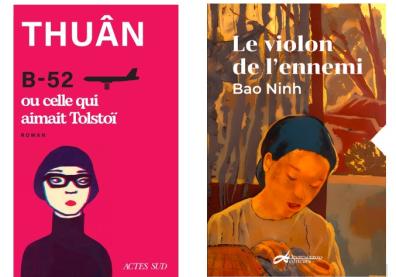Writing war. Translating war.

On the occasion of the 50th anniversary of the end of the Vietnam War, Ifrae is organizing a round-table discussion on Tuesday May 20, 2025 at 6 pm, with Thuân (novelist), Doan Cam Thi (translator and professor of Vietnamese literature at Inalco) and Victor Vuilleumier (professor of Chinese studies at Inalco) around two books published in March 2025:
B-52 ou celle qui aimait Tolstoï de Thuân, éditions Actes Sud.
In 1972, on the eve of the peace agreements ending the Vietnam War, the Americans launched an offensive on Hanoi, with over-equipped B-52 aircraft dropping thousands of tons of bombs on the city. The North Vietnamese army resisted, aircraft were shot down and enemy survivors were incarcerated. Some time later, the city's medical personnel were called in. The narrator of this book, a doctor, immediately spots one of them. Tolstoy is her favorite writer, and the prisoner is named after the hero of War and Peace. In a cell, in the heart of Hanoi's violent prisons, a secret complicity develops around the Russian language, literature and the desire to live. Then the door closed, the years passed and the young woman left for France. She liked Paris, but remained extremely lucid. Freedom is an illusion. Love is a comedy. Independent, optimistic, ironic and determined, she constantly confronts a world in which she wants to be a stranger, at a distance, overhanging. The memory of Andrei Bolkonsky never leaves her.
A novel shimmering with optimism and derision. Lots of humor to depict, through the itinerary of a young Vietnamese woman, the wanderings of this people of survivors partly exiled to escape the unbearable, to rebuild themselves elsewhere with an iron will, a discipline pegged to the body and an indestructible memory.
The Enemy's Violin by Bao Ninh, translated by Doan Cam Thi.
April 30, 2025 marks the 50th anniversary of the end of the Vietnam War, a reminder that the country had to face, in thirty-five years, three successive conflicts against Japan, France and the United States, not to mention the fratricidal war that pitted North against South for twenty-one years; major confrontations that left deep scars, both on the land and in people's consciences.
If the combatants distinguished themselves, the women were not to be outdone. In these five stories of exceptional literary quality, Bao Ninh paints portraits of original female figures, loving and free, the antipodes of submissive wives. The Enemy's Violin reveals their often tragic fates, and reinforces the ambiguous, romantic and cruel dimension of the author's discourse on the Vietnam War.